『武士道 Bushido 』-新渡戸稲造(Inazo Nitobé)-
Chapter 11
(Self-Control 人に勝ち己に勝つために)
Bushido, the Soul of Japan by Inazo Nitobe
[Book]
[reading]
・Chapter TOP 新渡戸稲造(Inazo Nitobé)TOP
・Chapter 00(Prefaces 序文)
・Chapter 01(Bushido as an Ethical System 武士道とは)
・Chapter 02(Sources of Bushido 武士道の源)
・Chapter 03(Rectitude or Justice 「義」)
・Chapter 04(Courage, the Spirit of Daring and Bearing 「勇」)
・Chapter 05(Benevolence, the Feeling of Distress 「仁」)
・Chapter 06(Politeness 「礼」)
・Chapter 07(Veracity or Truthfulness 「誠」)
・Chapter 08(Honor 「名誉」)
・Chapter 09(The Duty of Loyalty 「忠義」)
・Chapter 10(Education and Training of a Samurai 武士は何を学びどう己を磨いたか)
・Chapter 11(Self-Control 人に勝ち己に勝つために)
・Chapter 12(The Institutions of Suicide and Redress 「切腹」)
・Chapter 13(The Sword, the Soul of the Samurai 「刀」)
・Chapter 14(The Training and Position of Woman 武士道が求めた女性の理想像)
・Chapter 15(The Influence of Bushido 「大和魂」)
・Chapter 16(Is Bushido Still Alive? 武士道は蘇るか)
・Chapter 17(The Future of Bushido 武士道から何を学ぶか)
・[修養]、
・[自警録]
which was universally required of samurai.
The discipline of fortitude on the one hand, inculcating endurance without a groan, and the teaching of politeness on the other, requiring us not to mar the pleasure or serenity of another by manifestations of our own sorrow or pain, combined to engender a stoical turn of mind, and eventually to confirm it into a national trait of apparent stoicism. I say apparent stoicism, because I do not believe that true stoicism can ever become the characteristic of a whole nation, and also because some of our national manners and customs may seem to a foreign observer hard-hearted. Yet we are really as susceptible to tender emotion as any race under the sky.
I am inclined to think that in one sense we have to feel more than others—yes, doubly more—since the very attempt to, restrain natural promptings entails suffering. Imagine boys—and girls too—brought up not to resort to the shedding of a tear or the uttering of a groan for the relief of their feelings,—and there is a physiological problem whether such effort steels their nerves or makes them more sensitive.
It was considered unmanly for a samurai to betray his emotions on his face. "He shows no sign of joy or anger," was a phrase used in describing a strong character. The most natural affections were kept under control. A father could embrace his son only at the expense of his dignity; a husband would not kiss his wife,—no, not in the presence of other people, whatever he might do in private! There may be some truth in the remark of a witty youth when he said, "American husbands kiss their wives in public and beat them in private; Japanese husbands beat theirs in public and kiss them in private."
Calmness of behavior, composure of mind, should not be disturbed by passion of any kind. I remember when, during the late war with China, a regiment left a certain town, a large concourse of people flocked to the station to bid farewell to the general and his army. On this occasion an American resident resorted to the place, expecting to witness loud demonstrations, as the nation itself was highly excited and there were fathers, mothers, and sweethearts of the soldiers in the crowd. The American was strangely disappointed; for as the whistle blew and the train began to move, the hats of thousands of people were silently taken off and their heads bowed in reverential farewell; no waving of handkerchiefs, no word uttered, but deep silence in which only an attentive ear could catch a few broken sobs. In domestic life, too, I know of a father who spent whole nights listening to the breathing of a sick child, standing behind the door that he might not be caught in such an act of parental weakness! I know of a mother who, in her last moments, refrained from sending for her son, that he might not be disturbed in his studies. Our history and everyday life are replete with examples of heroic matrons who can well bear comparison with some of the most touching pages of Plutarch. Among our peasantry an Ian Maclaren would be sure to find many a Marget Howe.
It is the same discipline of self-restraint which is accountable for the absence of more frequent revivals in the Christian churches of Japan. When a man or woman feels his or her soul stirred, the first instinct is to quietly suppress any indication of it. In rare instances is the tongue set free by an irresistible spirit, when we have eloquence of sincerity and fervor. It is putting a premium upon a breach of the third commandment to encourage speaking lightly of spiritual experience. It is truly jarring to Japanese ears to hear the most sacred words, the most secret heart experiences, thrown out in promiscuous audiences. "Dost thou feel the soil of thy soul stirred with tender thoughts? It is time for seeds to sprout. Disturb it not with speech; but let it work alone in quietness and secrecy,"—writes a young samurai in his diary.
To give in so many articulate words one's inmost thoughts and feelings—notably the religious—is taken among us as an unmistakable sign that they are neither very profound nor very sincere. "Only a pomegranate is he"—so runs a popular saying—"who, when he gapes his mouth, displays the contents of his heart."
It is not altogether perverseness of oriental minds that the instant our emotions are moved we try to guard our lips in order to hide them. Speech is very often with us, as the Frenchman defined it, "the art of concealing thought."
Call upon a Japanese friend in time of deepest affliction and he will invariably receive you laughing, with red eyes or moist cheeks. At first you may think him hysterical. Press him for explanation and you will get a few broken commonplaces—"Human life has sorrow;" "They who meet must part;" "He that is born must die;" "It is foolish to count the years of a child that is gone, but a woman's heart will indulge in follies;" and the like. So the noble words of a noble Hohenzollern—"Lerne zu leiden ohne Klagen"—had found many responsive minds among us, long before they were uttered.
Indeed, the Japanese have recourse to risibility whenever the frailties of human nature are put to severest test. I think we possess a better reason than Democritus himself for our Abderian tendency; for laughter with us oftenest veils an effort to regain balance of temper, when disturbed by any untoward circumstance. It is a counterpoise of sorrow or rage.
The suppression of feelings being thus steadily insisted upon, they find their safety-valve in poetical aphorism. A poet of the tenth century writes, "In Japan and China as well, humanity, when moved by sorrow, tells its bitter grief in verse." A mother who tries to console her broken heart by fancying her departed child absent on his wonted chase after the dragon-fly, hums,
"How far to-day in chase, I wonder,
Has gone my hunter of the dragon-fly!"
I refrain from quoting other examples, for I know I could do only scant justice to the pearly gems of our literature, were I to render into a foreign tongue the thoughts which were wrung drop by drop from bleeding hearts and threaded into beads of rarest value. I hope I have in a measure shown that inner working of our minds which often presents an appearance of callousness or of an hysterical mixture of laughter and dejection, and whose sanity is sometimes called in question.
It has also been suggested that our endurance of pain and indifference to death are due to less sensitive nerves. This is plausible as far as it goes. The next question is,—Why are our nerves less tightly strung? It may be our climate is not so stimulating as the American. It may be our monarchical form of government does not excite us as much as the Republic does the Frenchman. It may be that we do not read Sartor Resartus as zealously as the Englishman. Personally, I believe it was our very excitability and sensitiveness which made it a necessity to recognize and enforce constant self-repression; but whatever may be the explanation, without taking into account long years of discipline in self-control, none can be correct.
Discipline in self-control can easily go too far. It can well repress the genial current of the soul. It can force pliant natures into distortions and monstrosities. It can beget bigotry, breed hypocrisy or hebetate affections. Be a virtue never so noble, it has its counterpart and counterfeit. We must recognize in each virtue its own positive excellence and follow its positive ideal, and the ideal of self-restraint is to keep our mind level—as our expression is—or, to borrow a Greek term, attain the state of euthymia, which Democritus called the highest good.
The acme of self-control is reached and best illustrated in the first of the two institutions which we shall now bring to view; namely,
Read文献、
book文献
TOP
日本の魂ー日本思想の解明ー
日本的思考の根源を見る。
”忠義”は追従ではない。”名誉”は求める心である。
(第三章 義-あるいは正義について)
サムライにとって、 卑怯な行動や不正な行動ほど恥ずべきものはない。
(第九章 忠義)
武士道は、われわれの良心を主君の奴隷となすべきことを要求しなかった
(第十章 武士の教育)
武士道は経済とは正反対のものである。それは貧しさを誇る。
(第十一章 克己)
心の奥底の思いや感情—特に宗教的なもの—を雄弁に述べ立てることは、日本人の間では、それは深遠でもなく、 誠実でもないことの疑いないしるしだと受け取られた。
(第十四章 女性の教育と地位)
妻がその夫、家庭そして家族のために身を捨てることは、男が主君と国のために身を捨てるのと同様、自発的かつみごとになされた。
|
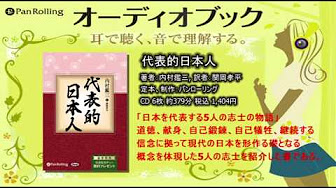
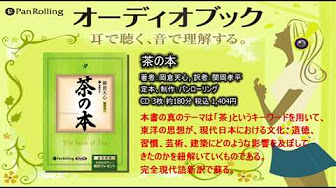
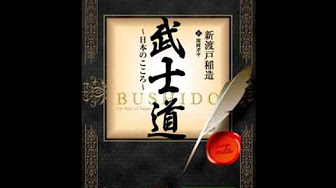


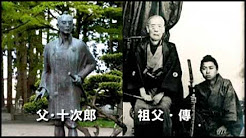

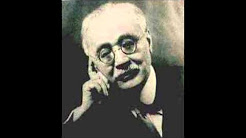



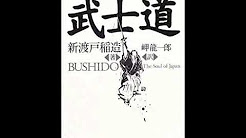
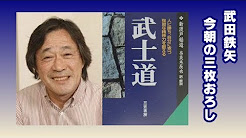
・新渡戸稲造
第1弾「世界を結ぶ『志』~新渡戸稲造の生涯~」、
第2弾「未来につながる『道』~新渡戸稲造の武士道~」、
第3弾「すべてに根ざす『愛』~新渡戸稲造の苦悩~」、
・ 新渡戸稲造の至極の名言集
・「新渡戸稲造の名言」20話
| |
・Bushido: The Soul of Japan by Inazo Nito(1-18)
・Bushido: The Soul of Japan by Inazo Nitobe(1-18)
・武士道「BUSHIDO」Japanese Ver.
・≪AI朗読≫武士道
・【武田鉄矢】『武士道』完全版
|
Bushido, the Soul of Japan
『武士道は定式化されたものではないが、昔もそして今も、日本人を鼓舞し、わが国を動かす原動力なのである』
日本人が日本人たりえる所以。
国家としての歴史的哲学体系を持たない日本の、現代社会においても尚、我々の血肉となり、在り続ける道徳律の根幹は「武士道」にあり。
日本人 新渡戸稲造博士が世界に発信した日本人論。
世代と国境を越え今なお読み継がれている世界的ベストセラー。
西洋・東洋の文化・哲学・思想と照らし合わせながら、その特異性と唯一無二の行動規範・心の拠り所を詳細に解説した普遍の書が、完全現代語訳、プロフェッショナルのナレーションで今蘇る。
21世紀。世界第三位の経済大国であるわが国日本。
政治的にも文化的にもより身近に世界と対峙する現代においてこそ、われわれの心の中に脈々と流れ続ける、日本人が日本人足らしめる「武士道」の精神を紐解く時なのではないだろうか。
本書は1世紀の時を超えた今も尚色褪せること無く、むしろその博識と見解、交える事例とそのユーモアに溢れた表現により現代人の我々にも実に痛快に日本の心「武士道」を理解させてくれる。
「武士道」がいつどのようにして始まったのか、それはどんな特徴を持ち、どのようなことを教えようとしているのか、武士以外の一般民衆にどのような影響を与えたのか、その影響がどれほど永く続いているか。
様々な角度・キーワードで武士の心得、さむらいの心の在り方をリレー形式で綴っている。
世界有数の犯罪率の低さ、大災害時での規律、自発的な他助の精神と行動は時代を超えて、親から子へと語り継がれてきた「道徳律」が存在し続けていることを如実に表している。
知っているようで知らない「日本の心」が、ここに明かされている。
内容抜粋
「今何とおっしゃいましたか?」と敬愛する教授は尋ねた。
「日本の学校には宗教の教育がないということでしょうか?」
そうですと答えると、教授は驚いて足を止めた。そして、今でも耳から離れない声音で、重ねてこう聞いた。
「宗教がない! だとしたら、いったいどうやって道徳を教えるんですか?」
この質問に私は意表を突かれ、とっさに答えを返すことができなかった。というのも、子どもの頃私が学んだ道徳というのは、学校で教わったものではなかったからである。私は、自分の持っている善悪正邪の概念を作り上げているさまざまな要素をひとつひとつ分析してみて、ようやく、それらを私の中に植えつけたのは「武士道」であったことに気づいた。
武士道とは、武士が守るよう求められる、もしくは、そう教えられる道徳的な作法である。文字に書かれたものはなく、せいぜい口伝えで伝えられた格言や、有名な武士や学者が書いたものが残されている程度である。
多くの場合そうしたものさえなく、しかしだからこそかえって深く心に刻まれ、守るべき掟<<おきて>>として強い拘束力を持っていた。ひとりの優秀な頭脳が考え出したものでもなければ、ひとりの高名な人物の生きかたが手本となってできたものでもない。数十年、数百年に及ぶ武士の歴史の中で自然に醸成されたものである。
「義は、道理に従ってためらうことなく、何をなすべきかを決断する力である。死ぬべきときは死を選び、討つべきときには討つことを選ぶ力である」
「戦いの真っただ中に飛び込んで討ち死にするのはいともたやすいことで、身分の卑しい者にもできる。生きるべきときは生き、死ぬべきときにのみ死ぬのが本当の勇気である」
「義に過ぎれば固くなる。仁に過ぎれば弱くなる」
「礼法の要点は精神を養うことにある。礼をもって静かに座っていれば、どんな乱暴者でも危害を加える気になれないほどに」
仁愛や謙譲の精神から生まれた礼儀は、他人に対する思いやりから生まれて、人への同情心を品よく優雅に表現するものだからである。
「心だに誠の道にかないなば祈らずとても神や守らん」
「忠ならんと欲すれば孝ならず、孝ならんと欲すれば忠ならず」
命は主君に仕えるための手段だと考えらえており、その理想形は、名誉のために命を捨てることであった。
「おのれの魂という畑が、優しい心で揺れ動くのを感ずるか? まかれた種が芽吹こうとしているのだ。言葉でそれを妨げてはならぬ。静かに、ひそやかに、自ら芽吹くのを見守っているのだ」
「死を軽<<かろ>>んずることは勇気のいる行為である。しかし、生きることが死よりもつらいときに、あえて生きることこそが本物の勇気である」
「かくすればかくなるものと知りながら やむにやまれぬ大和魂」
目次
訳者序文
初版への序文
改訂第10版への序文
新渡戸博士の『武士道』に寄せて
第1章 道徳体系としての「武士道」
第2章 武士道の源
第3章 「義」――あるいは正義について
第4章 「勇」――勇敢さと忍耐力
第5章 「仁」――慈愛の心
第6章 「礼」
第7章 「誠」――正直さと誠実さ
第8章 「誉<<ほまれ>>」――あるいは名誉について
第9章 「忠義」
第10章 武士の教育と鍛錬
第11章 自制心
第12章 切腹と敵討ちという制度
第13章 刀――武士の魂
第14章 女性の教育と地位
第15章 武士道から大和魂へ
第16章 武士道は今も生きているか
第17章 武士道のこれから
新渡戸稲造(Inazo Nitobe)
文久2年(1862年)、藩士 新渡戸十次郎の三男として南部藩(今の岩手県)に生まれる。
幼少期より東京英語学校に学び、少年期は、後に「代表的日本人」の著者でもある内村鑑三らとともに札幌農学校へ入学し学業を磨いた。
明治維新後はアメリカ・ドイツに渡り農政学を始め様々な研究に従事。
台湾総督府技師として台湾の殖産に携わり功績を挙げる。
国際連盟事務次長としても国際的に活躍。帰国後は様々な学校の教職を歴任した後、東京女子大学初代学長にもなる。
本書「武士道」は英語のみならずポーランド、ドイツ、ノルウェー、スペイン、ロシア、イタリアなど、主として欧米の多様な国の言語に翻訳され世界的ベストセラーとなる。旧五千円札の肖像画の人物としても有名。
TOP

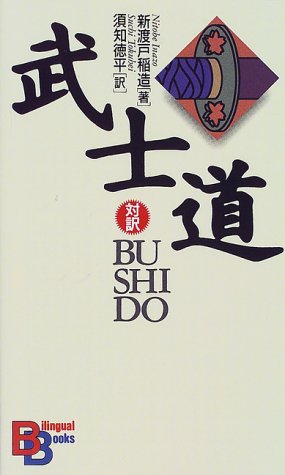
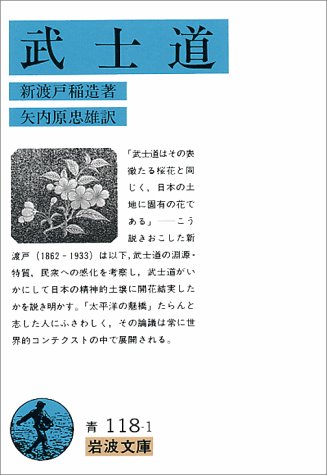
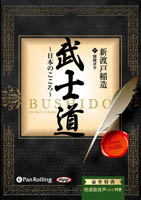 朗読,Read 朗読,Read
| 















 朗読,Read
朗読,Read
















 朗読,Read
朗読,Read